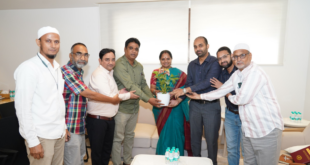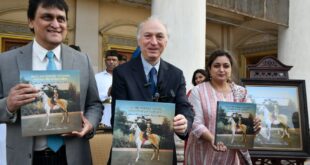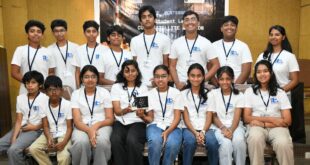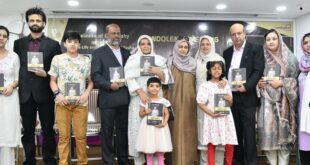Hyderabad, Jan 30: Working journalists who are independent of political and powerful influence are in danger in India, said renowned author and veteran journalist Seema Mustafa. Addressing an interactive session organized at the Ghulam Ahmed Auditorium at Sultan ul Uloom Education Society (SUES) by the Sarvodaya International Trust, Ms Seema Mustafa said phone calls of people in privilege often decide the news to be presented on a given day, more often belittling the importance of other stories even if they were relatively more important. This is driven by vested interests and corporate funding influencing the ideology of the media houses.
She said working journalists are in danger because of this system just like Gauri Lankesh was targeted. There are many others. Similarly, curbs on the journalists in Kashmir who were not allowed to participate in Republic Day celebrations are also condemnable.
Telangana State Minority Affairs Advisor Mr. A.K.Khan IPS Retd., SUES Secretary Mr. Zafar Javeed, Dr. Anupama Koneru, Ms. Chandana Chakraborthy, Mr. Amir Javeed and others were also present on this occasion.
The general public is consuming news fed to them by the media houses. Stories that are more news worthy, for instance, the struggle of the women who walked into Sabarimala Temple were not portrayed by the media. On the contrary, the opposite side was highlighted.
‘Marrying Gandhi with journalism’ on the occasion of Mahatma Gandhi’s death anniversary on Wednesday in her address, 63-year old veteran scribe said “newsrooms today are void of the Gandhian view of the media. Unlike the Gandhiji’s ideology to control media from within, Indian media is now mostly controlled by outside forces.” Reiterating Mahatma Gandhi’s quote, she said “media must write simply, factually, fearlessly and honestly.” As Gandhiji once said, the ‘sole aim of journalism is to serve.’
She strongly advised journalists against being propaganda machines, and said news reportage is all about what is not being done, and not just about what is being done.
Enlightening the gathering of students and intellectuals from different walks of life, she said journalism is not for anybody who can write merely.” It’s a profession of responsibility. Journalists must not write in anger and madness. They must not write to excite passion.”
She further stressed that “journalism is all about facts and it should not fill the news consumer with hate and dissent.”
For instance, most news videos circulated after the JNU incident on some major TV channels were fake, un-inspected and stooped new lows in the sense that these media houses exercised power without responsibility.
 Gawah (The Witness) – Hyderabad India Fearless By Birth, Pristine by Choice – First National Urdu Weekly From South India – Latest News, Breaking News, Special Stories, Interviews, Islamic, World, India, National News
Gawah (The Witness) – Hyderabad India Fearless By Birth, Pristine by Choice – First National Urdu Weekly From South India – Latest News, Breaking News, Special Stories, Interviews, Islamic, World, India, National News





